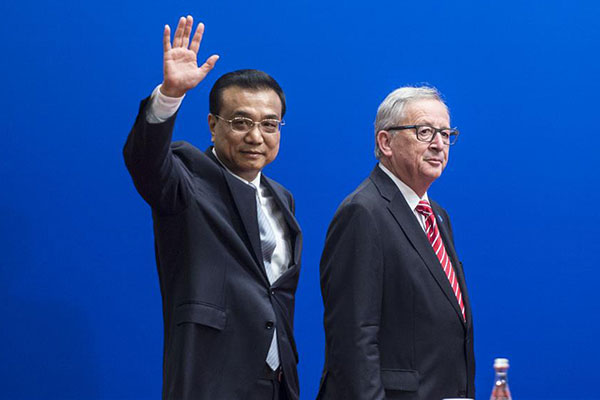
Premier Li Keqiang and European Commission President Jean-Claude Juncker attend the 11th EU-China Business Summit in Beijing, capital of China, July 13, 2016. Premier Li called for improved trade between China and the European Union.[Photo/Xinhua]
Further opening-up and improvement of foreign trade is among major efforts to promote China’s economic development and upgrades.
The efforts on foreign trade not only try to revitalize the slowing growth of foreign trade due to the stagnant world economy but more importantly focus on optimizing the foreign trade structure and cultivating new driving forces.
The following are plans and policy measures made by the State Council from January to July in a bid to develop the nation’s foreign trade:
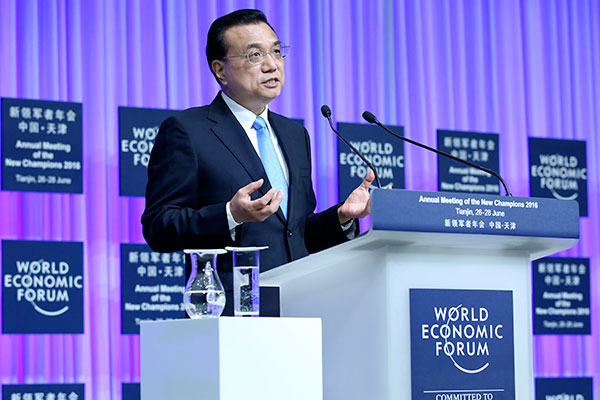
Premier Li addresses the opening ceremony of Summer Davos Forum in Tianjin, north China, on June 27, 2016. He said the world should oppose trade protectionism and develop a global economic system that is more balanced and open.[Photo/Xinhua]
July 19: Administrative regulations adjusted in China’s pilot FTZs
The State Council decided to adjust administrative regulations in China’s pilot free trade zones.
The decision is aimed at securing lawful practices of measures concerning reform and opening up in the pilot cities of Guangdong and Fujian provinces, and Tianjin and Shanghai municipalities.
Specific regulations include the foreign-capital enterprises law, the State Council’s decision on reform of the investment system and the catalogue for the guidance of foreign investment industries.
May 9: Measures to promote stable foreign trade
The State Council issued a guideline to promote stable foreign trade.
-Further reduce the credit insurance rate for short-term exports;
-Encourage financial institutions to offer loans to foreign trade enterprises, and expand the scale of export credit insurance financing;
-Further improve convenience for trading, including lowering the average inspection rate for exports at customs and reducing inspection rates for export enterprises with good credit;
-Improve export tax-refund policy and punish false claims of tax refund;
-Support the development of small border trade enterprises;
-Support the import of advanced equipment and technologies;
-Expand pilot areas for cross-border e-commerce;
-Encourage foreign trade enterprises to create their own brand and improve export quality.
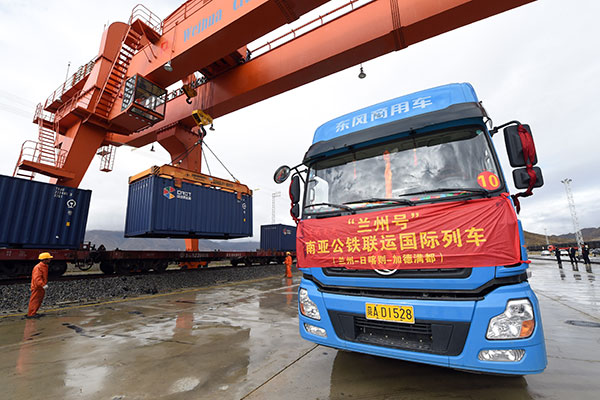
A Chinese lorry truck stops at a customs warehouse in Jilong county, southwest China’s Tibet autonomous region, May 17, 2016. China opened its first international land freight route with South Asian countries at Jilong, a frontier port bordering Nepal. [Photo/Xinhua]
April 27: Pilot zone in Northeast China to further opening-up efforts
The State Council approved the setup the Suifenhe-Dongning pilot development and opening-up zone in Northeast China’s Heilongjiang province.
The move will help strengthen the comprehensive strategic partnership between China and Russia, expand trade exchange and pragmatic cooperation with Northeast Asian countries and revitalize the old northeast industrial base.
According to the State Council, efforts will be made to:
-Promote inter-connectivity of basic infrastructures;
-Deepen investment and trade cooperation;
-Develop local industries, boost urbanization;
April 20: Measures to stabilize foreign trade
The State Council executive meeting pushed forward measures to promote and stabilize foreign trade.
Efforts will be made to:
-Encourage financial institutions to provide loans to profitable foreign trade enterprises, expand policy financing for export credit insurance;
-Improve policies for processing trade, cancel the approvals for the process trade business;
-Expand the number of test projects in cross-border e-commerce, support enterprises to build overseas marketing and service system, and develop domestic brands for foreign trade.
-Implement an active import policy, support the import of advanced equipment and technologies, and make use of foreign investments to promote trade;
-Further reduce the inspection rate for exports, and crack down on piracy and other illegal actions.

A staffer tries on virtual-reality goggles at an international e-commerce expo on April 11 at the Yiwu International Exhibition Center in East China’s Zhejiang province. The three-day event attracted about 1,200 companies from 11 countries.[Photo/Xinhua]
April 6: Establishing an inter-ministerial meeting system on trade facilitation
The State Council approved the establishment of an inter-ministerial meeting system on trade facilitation to implement the WTO Trade Facilitation Agreement.
The joint conference will be called the China trade facilitation committee, and made up of 16 ministries and departments, with Ministry of Commerce taking the lead.
The main function of the conference is to take care of issues related to the agreement.
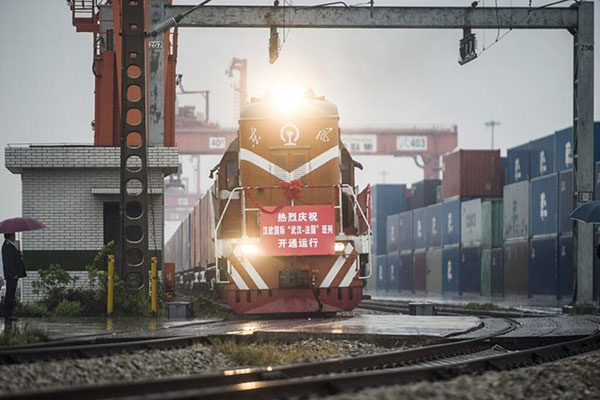
A freight train heading to Lyons of France sets off from Wujiashan Railway Center in Wuhan, capital of central China’s Hubei province, April 6, 2016. The train, which is loaded with mechanical, electronic and chemical products, marks the opening of the Wuhan-Lyons freight train. The train will travel 16 days and run 11,300 kilometers before arriving at Lyons. [Photo/Xinhua]
Feb 14: Service trade innovation to upgrade foreign trade
The State Council executive meeting decided to implement pilot projects for the innovative development of service trade in the next two years in 10 provincial regions and cities such as Tianjin, Shanghai, Shenzhen and Hangzhou, as well as five new state-level districts such as Harbin and Jiangbei New Area.
The pilot projects will promote foreign trade transformation and improve competitiveness in the service industry.
Efforts will be made to:
-Promote the preferential corporate income tax rate of 15 percent for service enterprises featuring advanced technology and expand the scope of beneficiaries from service outsourcing firms to other high-tech service industries;
-Set up guidance funds for innovation and development of the service trade to provide financing support to small- and medium-sized service enterprises;
-Encourage financial institutions to innovate businesses such as supply chain financing to impose bonded supervision on service enterprises featuring advanced technology that are identified by pilot regions.
Jan 18: Upgrade processing trade to high end of global value chain
The State Council released a plan to upgrade China’s processing trade to the high end of the global value chain by 2020.
Efforts will be made to:
-Attract foreign investments in advanced manufacturing and emerging industries, support coastal areas to develop competitive industries such as electronic information;
-Encourage enterprises in industries such as construction materials, chemical engineering and food to develop cross-border partnerships, especially with African countries and countries along the route of the Belt and Road Initiative;
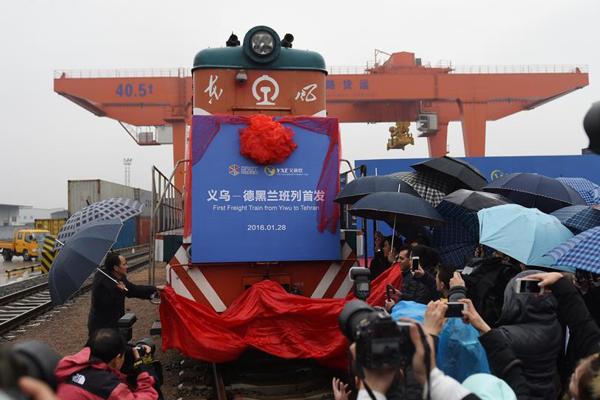
The first regular container train linking China to the Middle East is unveiled in Yiwu, East China’s Zhejiang province, Jan 28, 2016. The train will exit China through Alataw Pass in Northwest China’s Xinjiang and pass through Kazakhstan and Turkmenistan before reaching its destination Tehran, capital of Iran, completing a 14-day and 10,399-kilometer journey.[Photo/Xinhua]
Jan 15: Pilot areas for cross-border e-commerce
The State Council approved setting up pilot areas for cross-border e-commerce to explore new business models in China.
The new pilot areas will be located in 12 cities, including Tianjin, Shanghai, and Chongqing municipalities, Zhengzhou in Henan province, and Guangzhou in Guangdong province.
Jan 7: Development of major border areas
The State Council laid out plans in a guideline to develop major border areas.
The major border areas include five key pilot development and opening up zones, 72 national-level border ports, 28 border cities, 17 border economic cooperation zones and one cross-border economic cooperation zone.
Efforts will be made to:
-Lower the threshold for entrepreneurship and innovation to allow residents in border areas to register enterprises at “zero cost” and apply for entrepreneurship loans of less than 100,000 yuan ($15,170);
-Set up international law enforcement and security cooperation departments and establish a joint conference mechanism along the border
-Delegate power or cancel government reviews for more items related to clearance as well as imports and exports at national-level border ports;
-Draw on the experience of the Shanghai Pilot Free Trade Zone and try out the foreign investment management mode of pre-establishment national treatment with a negative list;
-Set up pilot tourist zones and implement the port visa policy in eligible pilot zones, so that overseas tourists there can be issued certificates for multiple departures and entries every year.
Jan 6: New pilot areas for cross-border e-commerce
The State Council executive meeting decided to set up new pilot areas for cross-border e-commerce.
The meeting agreed to expand the scope for policies and management garnered from the cross-border e-commerce pilot area in Hangzhou, Zhejiang province.
The central government will pick a batch of cities in East, Central and West China with solid economic foundations and large volumes of e-commerce and trade, and set up new pilot zones.
